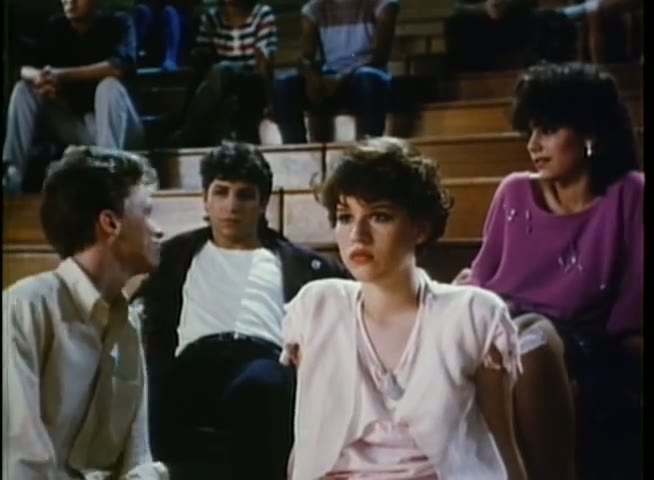Directed by:
John HughesScreenplay:
John HughesCinematography:
Bobby ByrneComposer:
Ira NewbornCast:
Molly Ringwald, Michael Schoeffling, Anthony Michael Hall, Paul Dooley, Carlin Glynn, Justin Henry, Haviland Morris, Gedde Watanabe, Blanche Baker (more)Plots(1)
For high schooler Samantha Baker (Molly Ringwald), her 16th birthday might be the worst day of her life. Her entire family has forgotten about it due to her older sister's impending wedding; her biggest crush, high school hunk Jake Ryan (Michael Schoeffling) has discovered an embarrassing "sex quiz" filled out by Sam in which she details how she is saving herself for him; and to make matters worse, she is hounded by a relentless nerd (Anthony Michael Hall) who won't take no for an answer. But Sam's sweet sixteen isn't over yet, and before the end of the night, all her birthday wishes could still come true. (Arrow Films)
(more)Reviews (1)
Thanks to the generational cult status of his films and their significance in the context of the development of coming-of-age movies, John Hughes is surrounded by an aura of a timeless classic, which, in turn can leave today’s viewers unpleasantly surprised at the problematic aspects of his films. On the other hand, that also highlights the fact that each of his films is a product of its time and in a different era we will inevitably perceive it outside of its context and, conversely, through a thoroughly modern lens. Today, therefore, the insularity of white suburbia, the clichéd motivational elements of the main characters and, in particular, the gender conservatism and extremely disturbing behaviour of young men towards girls can elicit deserved outrage. Despite the audience’s occasional discomfort, Hughes’s films retain their charm, energy and, primarily, empathy for their characters, thanks to which they remain entertaining and hugely rewarding for viewers, something that certainly cannot be said for most of the teen movies that came before, at the same time as and after Hughes’s film. Sixteen Candles was Hughes’s first screenplay on the subject of adolescence to be made, and it obviously follows the trend of teen comedies at that time, such as Porky's, which were based on puerile adolescent optics, frat-house jokes, sexual innuendo and the fetishisation of female bodies. Hughes’s directorial debut represented a revolution in the genre, as he retained the structure of episodic gags and the framework of an out-of-control party, but instead of the usual exuberant and self-confident guys, he constructed the entire narrative around an adolescent girl and her world concurrently composed of school and family. Primarily, however, this film stands on the foundations on which all of Hughes’s subsequent work was built, which are empathy for all of the characters and, above all, revealing the personalities behind the formulaic façade of a pigeonhole on the social ladder. Though the hierarchy of the group and its individual castes may, in the better case, be disappearing today, or rather male and female students care more about at least outwardly fitting in with the uniform mass and thus standing out less in public, in past decades this dynamic was the be-all and end-all of growing up. Unlike other films, which pigeonholed characters as the asocial geek, the handsome jock, the prom queen and the athletic amazon and reinforced the lines of demarcation between them, Hughes conversely showed the inner lives of the characters beyond their superficial surface. Sixteen Candles does not delve as deeply as the later genre milestone The Breakfast Club into revealing human characters hiding their true emotions, personalities and private lives behind the armour of the roles that they assume. However, that’s not even possible because, in contrast to the intimate minimalism and constricted melodramatic framework of the later film in which seven characters completely sufficed, in his debut feature, Hughes composes a complex Altmanesque mosaic of nearly twenty characters, most of whom he allows to show themselves in a different light than that in which we see them at the beginning (which is a dramaturgical principle that the best modern coming-of-age films, including Whip It! and Booksmart, have borrowed from Hughes). The same applies also for most of film’s problematic elements and the statements of some of the characters. --- SPOILER START --- Though Long Duk Dong initially comes across as a frighteningly stereotypical character, over the course of the film he is given fundamentally larger space and broader characterisation than such characters in most other films and even becomes a proto-McLovin. For Caroline, Farmer Ted and Jake, the development of the evening and the morning after also receives an empathetic resolution in their final settling of accounts, even though it is at times terrifying in its treatment of the girl as an object and her abuse. --- SPOILER END --- High-school movies inevitably age, but the best of them at their core resist the ravages of time and can thus be a wonderful portrait of modern civilisation, which will never be flawless but is gradually learning to be better. In the case of John Hughes, the sad fact that even the most sensitive among us can sometimes do incredibly shitty things and be very insensitive, especially when we are still finding ourselves (even though we think we are already tremendously mature), becomes that much more obvious. Though it would be nice not to do such things at all, that's not how humans work, so it is mainly a matter of whether we learn from those mistakes as a civilization and as individuals. Hughes laid the groundwork for more timely and even more sensitive portraits of adolescence and composed a variation on Sixteen Candles himself with Pretty in Pink.
()
(less)
(more)

